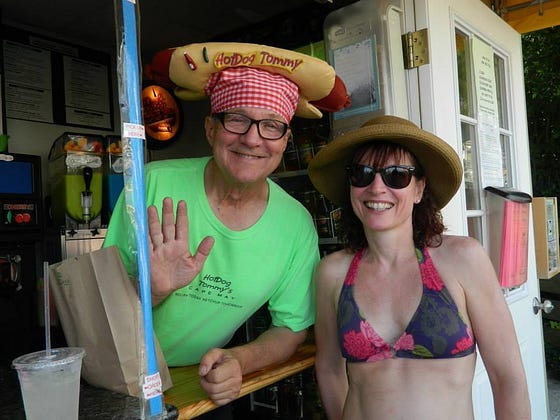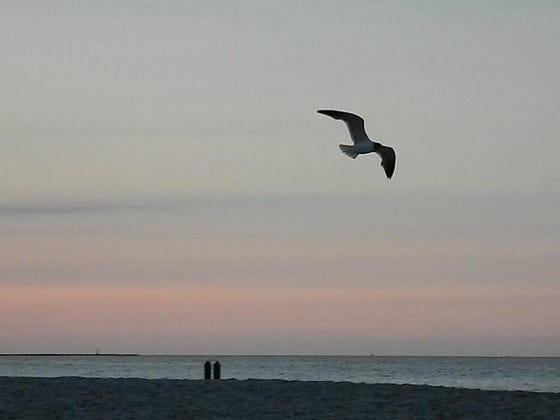Author’s note: This story was first published on the Medium platform in The Memorist. If you are a Medium subscriber, please read it here so I can make a little coin. My Substack is free to all who venture near, but don’t be stingy with those hearts and comments. I’m after fame as well as fortune m’dears.

It had been ten years, maybe fifteen since anyone had awakened me from a sound sleep. My husband Doug's hand on my shoulder shook me into consciousness.
"Denny," he said, "Wake up. Maya's dead."
I thought I was dreaming but knew I wasn't when I saw my husband's face. I'd only seen him cry a handful of times in 48 years. He was flat-out weeping. That's when I believed she was gone. But there was more to tell. Much more.
"She killed herself."
"What? No! Maya?"
It didn't seem possible that my earnest, funny, fearless friend had decided to die. I'd never known anyone more alive. No one embraced honesty, nature, joy, or the wonder of life on Earth more than she did. How could she give it up so soon? Why, Maya, why?
Maya was only 58. Her daughter was grown but not yet settled. An elementary teacher by trade, Maya would have loved grandchildren. She had so much to show them and share. Too chic to wear a "World's Greatest Grandma" sweatshirt, she would have given any of those who weren't a run for their money.
Experience has taught me to be wary of the word "love" when it comes to friends, but I loved Maya and knew she loved me. Every time we parted, she wept. How many friends do that?
Maya was Swiss and fearless. We'd known her for over thirty years and lived in California when we first met. Doug's former work colleague Monique had relocated to Switzerland, and her boss Ruedi was embarking on a six-week tour of the United States. She asked if it was okay if he and a friend stopped in to see us. We offered to host them for a few days while they toured the San Francisco Bay Area.
It turned out that Maya wasn't exactly a friend. Ruedi had advertised for a travel companion to share the driving on an extended U.S. trip, and she answered. They worked out a plan for what was (as far as we know) a strictly platonic arrangement, exchanged credentials and references, and hopped on a plane.
Ruedi and Maya bought a cheap used car in Georgia and drove across the country. That trip is a story in itself, with many amusing anecdotes and adventures sparked by Maya's irrepressible personality.
One example was when she followed a Highway Patrol car and accelerated well above the speed limit to pass it. Ruedi tried to dissuade her from such a move, but she ignored him. He was sure they were going to jail when the astonished patrol officer pursued and pulled them over; he asked, "What the Hell do you think you're doing?"
Her response? "I'm sorry, but you were driving so slow." To Ruedi's astonishment, they got off with a warning. Her youth, beauty, and adorable accent saved the day. When the officer left, she turned to Ruedi and said smugly, "You see?" He wouldn't talk to her for the rest of the day.
Maya had several run-ins with law enforcement in her travels that summer but got away unscathed by pulling what we dubbed her "Swiss Miss Routine." It went something like this:
"Oh, sir! I am so sorry! I didn't know. I am only a short time in your beautiful country."
When the pair arrived at our home in Alameda, we all became fast friends. They used our home as a base as they toured the area. Ruedi had a shorter travel time allotment and left first. He signed the car over to Maya so she could sell it before she went home a few weeks later.
She was an outstanding house guest. One day, I came home from work to find she had finished painting a bedroom I had started working on and had been lazy about finishing. After that, she could have stayed forever, as far as I was concerned.
Instead of flying home from California, Maya told us she decided to drive back across the country alone and leave from New York. She planned to sleep in her car along the way. We were not fans of that plan, but she was insistent, so we armed her with a Taser and arranged for her to stay with several of our friends and family along the way.
My nephews in Kansas were in awe of her: a five-foot-nothing twenty-something with only pretty good English striking out across the plains on her own. Her mere existence was shocking enough, but a girl with a Taser? That's something you don't see every day in Hutchinson. She made a lasting impression. In the years that followed, we kept in touch.

Doug and I visited Maya in Switzerland at her parents' house in Port. She had arranged a surprise for us: a traditional Swiss meal prepared on-site at a historic Swiss chalet she rented especially for the occasion. She had decorated the place with paper lanterns and made us fondue from scratch on a wood stove. We toasted our friendship with ample shots of kirsch. It was a magical evening.
We later learned that Maya had trouble securing the chalet. The historic building was available only to Port residents, and Maya's family had lived there for only 20 years. (Switzerland takes citizenship very seriously.) She pestered the local authorities until they finally gave in.
We returned to Switzerland several times over the years: Doug for Maya's wedding to her husband Martin and both of us twice to Gimmelwald, where they joined us.
Another time, Maya met us in Barcelona when we stopped there on a cruise. We all went to Montserrat together.
In the U.S., she and her family joined us for a Cape May, New Jersey beach vacation. In recent years, we had to cancel a planned trip to Ireland together due to COVID-19 restrictions.
"What happened?" I asked.
As bad as the news was, his answer was worse.
"She stepped in front of a train."
For the rest of the day, we wept, repeatedly, asking the question, "Why, Maya? Why?" We tried to imagine what prompted her to make such a final, irrevocable choice. We knew she had suffered from chronic back pain, but she'd told us that physical therapy had improved her situation a great deal.
Ruedi, with whom she'd stayed in contact, told us he knew she was concerned about how growing older might limit her mobility, but that's something everyone worries about. It's possible she'd received a medical diagnosis that she kept secret, but that's unlikely. She wasn't typically secretive about her health issues.
Her husband Martin told us she had been struggling with depression, but they had recently returned from a trip to Germany, where they had a wonderful time. After they got home, her mood darkened. He said that nothing they tried seemed to help.
What I found additionally hard to fathom was how she chose to kill herself. Physician-assisted suicide is legal in Switzerland. You don't have to have a medical or psychiatric reason. If Maya was determined to end her life, there was a comfortable, easy option available to her.
Why she chose such a violent end is a mystery. Maya was considerate of others. Had she been thinking, she would have worried about the impact on the engineer driving the train, the people who had to recover her body, and the effect the news would have on her young students.
When I discussed this with my psychiatrist, Tania, she asked, "Was she impulsive?" I had to say yes. Tania nodded. I could tell it was a story she'd heard before. Maya hadn't been thinking that day. She may not have planned to do what she did until the moment arrived.
It's been nine months, and we're still grieving. We ask ourselves, "Could we have helped if we had known what Maya was going through?" But that's typical of survivors.
We want to believe there are magic words or things we could have said or done to fix everything. But life isn't like that. Every heart has a private chamber, and on the door is a sign that reads, "Do Not Disturb."






This is so horrible, Denise, and I am so sorry. That poor, sweet soul.
Reading after Alison Tennent mentioned in her own piece about suicide just now. So sorry for the loss of your wonderful friend.